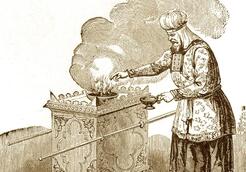| How are guilt and taxes related, and why should we care? Judaism's ancient bedrock offers answers that might seem outdated, but they were far ahead of their time. The Book of Leviticus opens with language that we moderns might find distant, but it offers us profound lessons about the proper roles of materialism and money in spiritual life – and what the point of spiritual life is supposed to be. |
By Rabbi David Evan Markus
Parashat Vayikra 5784 (2024)
After the excitement of the Book of Exodus (slavery! liberation! split the sea! Sinai! Torah! Golden Calf! Mishkan!), this week opens the Book of Leviticus and a whole new narrative.
Leviticus is named for the Levites and their priestly system of doing Jewish, long before the word "Jewish" would describe a people, religion or nation. The word "Jewish" would come later from the kingdom of Judea centered on modern-day Israel (which, in turn, hails from the kingdom of Israel to Judea's north and, before that, the patriarch Jacob's renaming as Israel).
But in this week's Torah portion (Vayikra), we're long before any of that.
Leviticus opens a window on Judaism's earliest history as a religion and spiritual system. Before there'd be an "Israel," or a "Temple" in "Jerusalem," or even a fully cohesive people to call our spiritual ancestors, there was this first ritual layer. Like an archeologist digging into layers that accreted over time, we dig deep and reach the bedrock of pre-Israelite tradition.
To modern eyes, the bedrock Leviticus reveals can seem as alien as the Moon. It seems to bear no resemblance to what we know as Judaism (or any modern faith). In it, we find no prayer, no liturgy, no books (the printing press won't be invented for another 3,000 years), few familiar symbols, and perhaps nothing that instantly seems "spiritual."
Yet it is spiritual – and in some ways, far ahead of its time. Immediately we encounter the spiritual importance of remitting guilt and the deep wisdom of progressive economics – but to get there, first we need a primer on the language of the Book of Leviticus itself.
The Levitical Backstory
Leviticus is about spiritual states and how we shift them. Translators render these spiritual states as "pure" (tahor) and "impure" (tamei), more accurate words might be "uncharged" and "charged." A "charged" state might come from a dead body, guilt, disease, sex, or birthing a child. These aren't inherently un-spiritual – far from it! – but they're different from the "purity" of Torah, saying "I do" under a huppah, or releasing guilt and making amends.
Leviticus recognized that life will naturally "charge" us (tamei), and offered ways to dis-charge to restore our natural tahor state. (That's a big deal: our natural state is purity.) Today, we might shift gears with prayer, yoga, meditation, nature hikes, volunteerism, giving tzedakah and social advocacy. In Iron Age Judaism, the main levitical method was physical sacrifice.
Parashat Vayikra 5784 (2024)
After the excitement of the Book of Exodus (slavery! liberation! split the sea! Sinai! Torah! Golden Calf! Mishkan!), this week opens the Book of Leviticus and a whole new narrative.
Leviticus is named for the Levites and their priestly system of doing Jewish, long before the word "Jewish" would describe a people, religion or nation. The word "Jewish" would come later from the kingdom of Judea centered on modern-day Israel (which, in turn, hails from the kingdom of Israel to Judea's north and, before that, the patriarch Jacob's renaming as Israel).
But in this week's Torah portion (Vayikra), we're long before any of that.
Leviticus opens a window on Judaism's earliest history as a religion and spiritual system. Before there'd be an "Israel," or a "Temple" in "Jerusalem," or even a fully cohesive people to call our spiritual ancestors, there was this first ritual layer. Like an archeologist digging into layers that accreted over time, we dig deep and reach the bedrock of pre-Israelite tradition.
To modern eyes, the bedrock Leviticus reveals can seem as alien as the Moon. It seems to bear no resemblance to what we know as Judaism (or any modern faith). In it, we find no prayer, no liturgy, no books (the printing press won't be invented for another 3,000 years), few familiar symbols, and perhaps nothing that instantly seems "spiritual."
Yet it is spiritual – and in some ways, far ahead of its time. Immediately we encounter the spiritual importance of remitting guilt and the deep wisdom of progressive economics – but to get there, first we need a primer on the language of the Book of Leviticus itself.
The Levitical Backstory
Leviticus is about spiritual states and how we shift them. Translators render these spiritual states as "pure" (tahor) and "impure" (tamei), more accurate words might be "uncharged" and "charged." A "charged" state might come from a dead body, guilt, disease, sex, or birthing a child. These aren't inherently un-spiritual – far from it! – but they're different from the "purity" of Torah, saying "I do" under a huppah, or releasing guilt and making amends.
Leviticus recognized that life will naturally "charge" us (tamei), and offered ways to dis-charge to restore our natural tahor state. (That's a big deal: our natural state is purity.) Today, we might shift gears with prayer, yoga, meditation, nature hikes, volunteerism, giving tzedakah and social advocacy. In Iron Age Judaism, the main levitical method was physical sacrifice.

Yes, physical sacrifice, but not the Binding of Isaac kind.
Our ancient ancestors would bring agricultural goods and foodstuffs to an altar manned (back then, always
"man"-ned) by the kohen (priest), who would instruct him (back then, always "him") to place his hand on the item and offer it to God. This ritual, and sometimes also by washing and letting time pass, the "charged" spiritual state would be dis-charged.
At first glance, this sacrificial system makes no sense to us today – but that's because we don't have our ancestors' instincts. In Hebrew, "sacrifice" is a korban, literally drawing-close to God. The English word "sacrifice" hails from Latin's "to make holy" (think "sacred"). In ancient days, we took our most precious physical things – livestock that functioned as both wealth and food – and offered them to God to draw close and make holy. Back then we were close to our livestock, and close to the land, so this ritual would feel like a spiritual jolt.
On Guilt and Taxes
How Torah structured this ancient system has much to teach us today. The need to shift from tamei ("charged") to tahor ("uncharged") was so important that Torah let nothing inhibit it.
Our ancient ancestors would bring agricultural goods and foodstuffs to an altar manned (back then, always
"man"-ned) by the kohen (priest), who would instruct him (back then, always "him") to place his hand on the item and offer it to God. This ritual, and sometimes also by washing and letting time pass, the "charged" spiritual state would be dis-charged.
At first glance, this sacrificial system makes no sense to us today – but that's because we don't have our ancestors' instincts. In Hebrew, "sacrifice" is a korban, literally drawing-close to God. The English word "sacrifice" hails from Latin's "to make holy" (think "sacred"). In ancient days, we took our most precious physical things – livestock that functioned as both wealth and food – and offered them to God to draw close and make holy. Back then we were close to our livestock, and close to the land, so this ritual would feel like a spiritual jolt.
On Guilt and Taxes
How Torah structured this ancient system has much to teach us today. The need to shift from tamei ("charged") to tahor ("uncharged") was so important that Torah let nothing inhibit it.
| Leviticus 5 lays out the ancient way to remit guilt: For grave matters, bring a cow; for the rest, offer a female goat on the altar – feeling it to be valuable and instead of yourself. But what if one lacked means to offer a goat? Torah thought ahead: instead, bring two turtle doves or pigeons. These were less expensive and easier to come by. But what if one lacked means for two birds? Again, Torah thought ahead: bring flour. |
Torah's point is profound. Fully 3,500 years ago, Torah envisioned progressive taxation as a matter of holy mandate. Ask more from those having more, less from those having less, yet always something from everyone. And the point? To ensure that spiritual transformation rooted in community would be available to everyone regardless of means.
Drawing close to God and transforming ourselves were (and are) so important that nothing should be allowed to get in their way. The need to shift states was (and is) so important that the twin values of needful practicalities and fair access must be held in balance. The system asked good faith from everyone: simply bringing flour as the lowest common denominator wasn't the point. This failsafe was for those who truly could not do more – and, it would enough, complete, equal and whole.
That's the blueprint for Jewish life, set down 3,500 years ago. We were far ahead of our time. We'd do well to remember now the values set down in the bedrock of our people.
Drawing close to God and transforming ourselves were (and are) so important that nothing should be allowed to get in their way. The need to shift states was (and is) so important that the twin values of needful practicalities and fair access must be held in balance. The system asked good faith from everyone: simply bringing flour as the lowest common denominator wasn't the point. This failsafe was for those who truly could not do more – and, it would enough, complete, equal and whole.
That's the blueprint for Jewish life, set down 3,500 years ago. We were far ahead of our time. We'd do well to remember now the values set down in the bedrock of our people.



 RSS Feed
RSS Feed